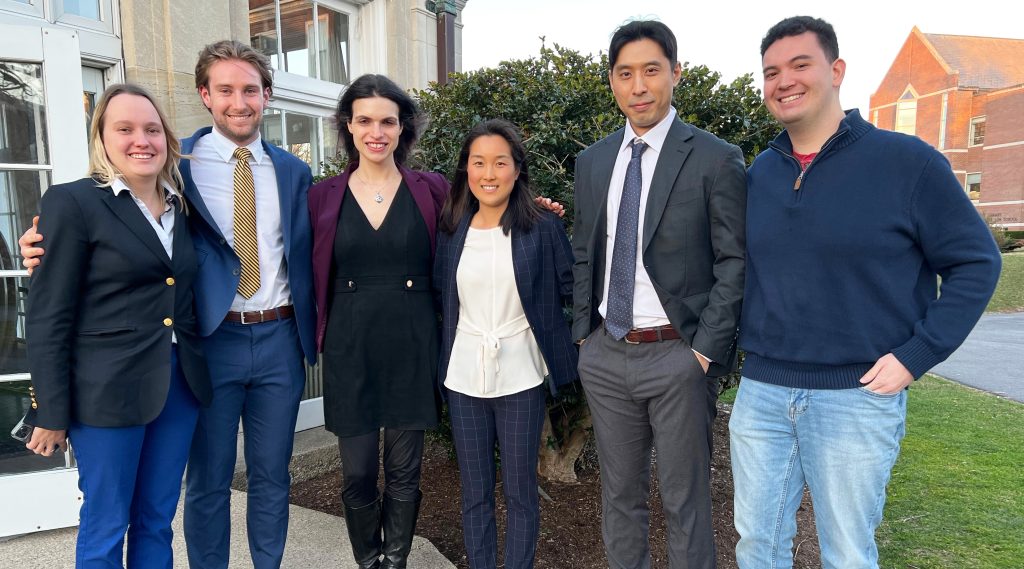BC Law’s Jessup International Moot Court Team last weekend ended its impressive run at the Jessup Cup among the top 94 teams out of over 700 law schools in the competition. “This is one of the best Jessup teams we’ve ever fielded at BC Law,” said Thomas Carey ’65, who has coached the teams for decades. “They are the epitome of the lawyers BC Law has always tried to produce, and should be commended for representing us so well.”
In late March, when word began circulating around Boston College Law School that the Jessup Team was one of only 12 American teams progressing to advanced rounds in the annual competition, the community responded with a flurry of congratulations. Jessup and BC Law go back many years, and this year’s team made good on a valued legacy. Boston College was the Jessup World Cup Champion in 1986 under the guidance of Professor Peter Donovan.
Jessup is the world’s largest moot court competition, with participants from roughly 700 law schools in 100 countries and jurisdictions, according to the International Law Students Association (ILSA) website. It is named after Philip C. Jessup, a US diplomat and scholar who went on to serve as a judge on the International Court of Justice between 1961 and 1970.
The competition is a simulation of a fictional dispute between countries before the International Court of Justice (ICJ), the judicial organ of the United Nations. Teams prepare oral and written pleadings arguing both the applicant and respondent positions of the case. The case at issue this year involves matters of national self-determination, sovereignty, free speech, cybercrime, foreign interference in elections, and diplomatic privileges.
As BC Law Associate Dean of Faculty & Global Programs Katharine Young noted, “These issues could not be more relevant to matters of peace and security in the current world order, Ukraine included. With its handling of this problem, the Jessup team masterfully demonstrated the importance of the international limb of the BC Law degree.”
Elizabeth Platonova and Owen Braley, representing the applicant, and Heesoo Park and Connie Lee, representing the respondent, were just coming off four arguments in the previous five days when they learned they were among the remaining 94 international teams headed toward the Jessup Cup on April 10. Mateo Dayo, a second-year student on the team who assisted in the legal research and writing of the lengthy written briefs for each side, will be an oralist next year. Other US teams alongside BC Law at that stage included Harvard, the University of Pennsylvania, and the University of Virginia.
The BC Law team had prepared hard since last September, coached by Professor David Wirth, Jeanne Semivan ’09, David Kete ’14, and Carey; guided by longtime oral advocacy mentor Rosemary Daly ’87; and drilled by volunteer faculty and alumni who sat on moots to get the team to where it is today.
“The students this year have worked hard and their success into the last several rounds was well-earned,” said Semivan. “They made the most of the opportunities the Jessup program provides. And beyond being talented oral advocates, they have been supportive of each other, and a joy to work with on a personal level. It has been gratifying to watch them all grow as advocates through the course of the year.”
The rigor of the team’s preparation was on full display on March 21 during an exhibition moot at BC Law. The teams presented arguments to a bench of specialist judges acting as the ICJ: Professor Wirth, Dean Young, and Vik Kanwar, director of graduate and global programs.
At the exhibition moot, the judges, as they tend to do, beset each team with questions that elucidated and probed critical inflection points, gaps, and practical and theoretical questions related to the bounds of international law. The case largely revolved around the issue of determining the point at which offensive cyber operations and disinformation rise to the level of offending international law, and what bodies like the ICJ can do about such offenses.
The scrutiny of the judges and oral advocacy of the students created something of a high intensity tennis match, demonstrating the students’ mastery of international law.
International law, as the term would connote, is an extremely complex topic, involving the examination of the treaties between sovereign states and the customary practices that help establish the world order. It differs from domestic law in a number of ways, including in its approach to questions of enforcement, remedy, and dispute resolution.
Each side demonstrated a mastery over the myriad of grey areas that comprise the background of international law and the United Nations—wrestling with well-known precedent like the Bosnian Genocide, Iran-Contra, and the Rwandan genocide and attempting to apply international accords like the Budapest Convention on Cybercrime, the regulation of botnets across borders, and asymmetric warfare.
The scrutiny of the judges and oral advocacy of the students created something of a high intensity tennis match during the BC Law exhibition moot, demonstrating the students’ mastery of international law, as each student was able to tactfully withstand even the most rigorous of questioning by the mock ICJ.
“In advancing to the global rounds, this year’s Jessup participants joined a long history of BC Law teams that have turned in distinguished performances, as well as having the benefit of this unique, career-defining experience,” said Professor Wirth. “It has been a privilege both to coach the team and to teach the accompanying course, International Law, here for more than 20 years.”
Tom Blakely ’23 and Vicki Sanders contributed to this report.


